联合国文件翻译课件
- 格式:ppt
- 大小:242.00 KB
- 文档页数:51
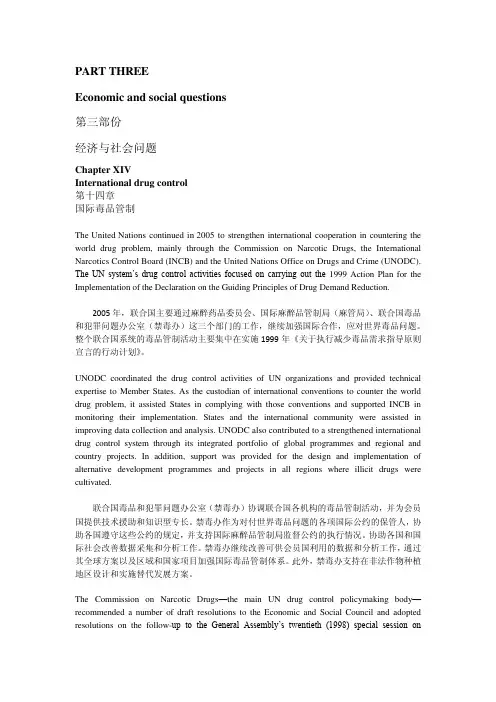
PART THREEEconomic and social questions第三部份经济与社会问题Chapter XIVInternational drug control第十四章国际毒品管制The United Nations continued in 2005 to strengthen international cooperation in countering the world drug problem, mainly through the Commission on Narcotic Drugs, the International Narcotics Control Board (INCB) and the United Nations Office on Drugs and Crime (UNODC). The UN system’s drug control activities focused on carrying out the 1999 Action Plan for the Implementation of the Declaration on the Guiding Principles of Drug Demand Reduction.2005年,联合国主要通过麻醉药品委员会、国际麻醉品管制局(麻管局)、联合国毒品和犯罪问题办公室(禁毒办)这三个部门的工作,继续加强国际合作,应对世界毒品问题。
整个联合国系统的毒品管制活动主要集中在实施1999年《关于执行减少毒品需求指导原则宣言的行动计划》。
UNODC coordinated the drug control activities of UN organizations and provided technical expertise to Member States. As the custodian of international conventions to counter the world drug problem, it assisted States in complying with those conventions and supported INCB in monitoring their implementation. States and the international community were assisted in improving data collection and analysis. UNODC also contributed to a strengthened international drug control system through its integrated portfolio of global programmes and regional and country projects. In addition, support was provided for the design and implementation of alternative development programmes and projects in all regions where illicit drugs were cultivated.联合国毒品和犯罪问题办公室(禁毒办)协调联合国各机构的毒品管制活动,并为会员国提供技术援助和知识型专长。
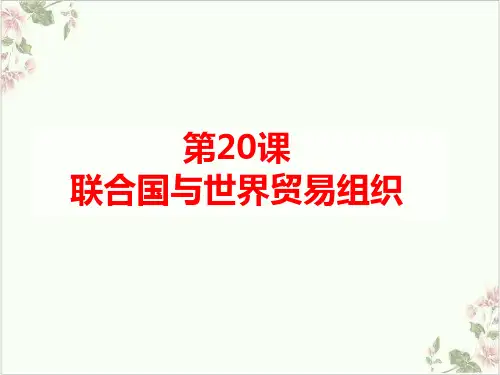
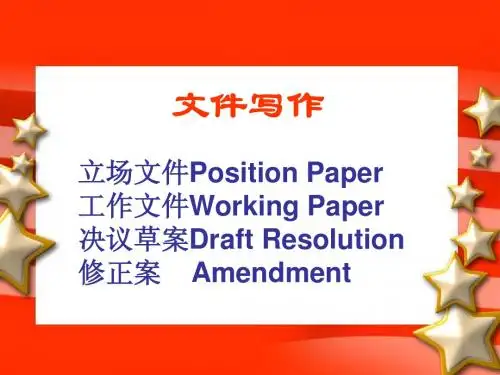
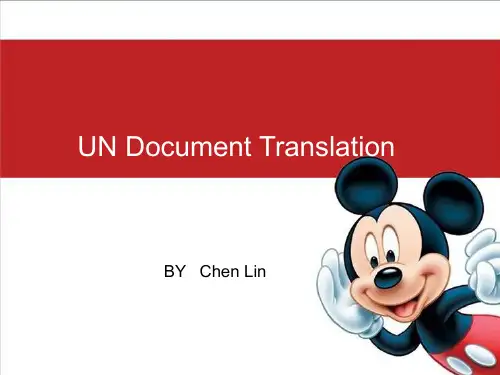
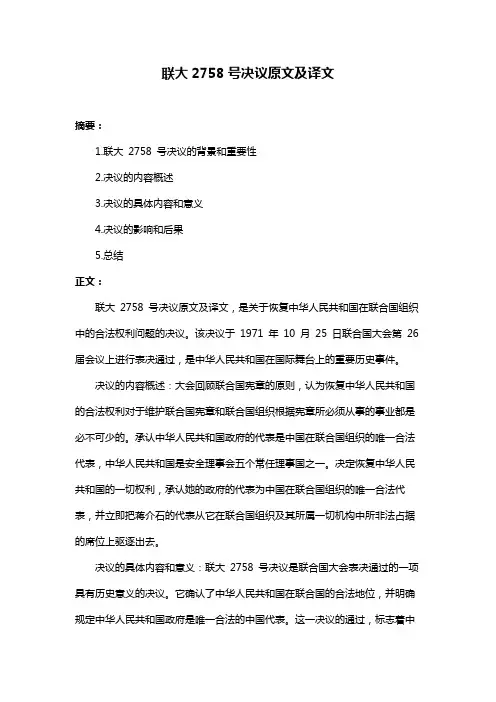
联大2758号决议原文及译文摘要:1.联大2758 号决议的背景和重要性2.决议的内容概述3.决议的具体内容和意义4.决议的影响和后果5.总结正文:联大2758 号决议原文及译文,是关于恢复中华人民共和国在联合国组织中的合法权利问题的决议。
该决议于1971 年10 月25 日联合国大会第26 届会议上进行表决通过,是中华人民共和国在国际舞台上的重要历史事件。
决议的内容概述:大会回顾联合国宪章的原则,认为恢复中华人民共和国的合法权利对于维护联合国宪章和联合国组织根据宪章所必须从事的事业都是必不可少的。
承认中华人民共和国政府的代表是中国在联合国组织的唯一合法代表,中华人民共和国是安全理事会五个常任理事国之一。
决定恢复中华人民共和国的一切权利,承认她的政府的代表为中国在联合国组织的唯一合法代表,并立即把蒋介石的代表从它在联合国组织及其所属一切机构中所非法占据的席位上驱逐出去。
决议的具体内容和意义:联大2758 号决议是联合国大会表决通过的一项具有历史意义的决议。
它确认了中华人民共和国在联合国的合法地位,并明确规定中华人民共和国政府是唯一合法的中国代表。
这一决议的通过,标志着中华人民共和国在国际事务中的地位得到了充分的肯定和认可,对于中国在国际事务中发挥更大的作用具有重要的意义。
同时,该决议的通过也意味着蒋介石的代表被驱逐出联合国,中国台湾地区不再拥有在联合国的席位。
决议的影响和后果:联大2758 号决议的通过,不仅使中华人民共和国在联合国的合法地位得到确认,而且对于中国在国际事务中的地位和作用的提升产生了深远的影响。
此后,中华人民共和国开始在联合国及其所属机构中发挥越来越重要的作用,参与了许多重要的国际事务和决策,为维护世界和平、促进国际发展做出了积极的贡献。
同时,该决议的通过也为中国与世界各国建立和发展外交关系提供了重要的法律依据和政治保障。
总结:联大2758 号决议原文及译文,是关于恢复中华人民共和国在联合国组织中的合法权利问题的决议。
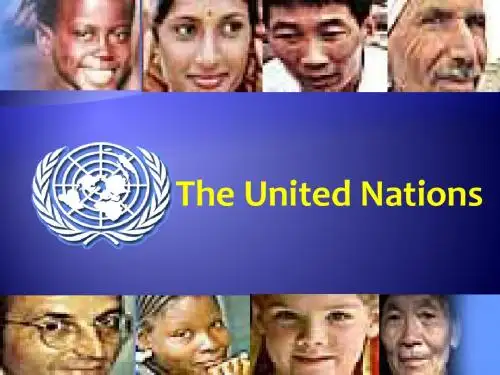
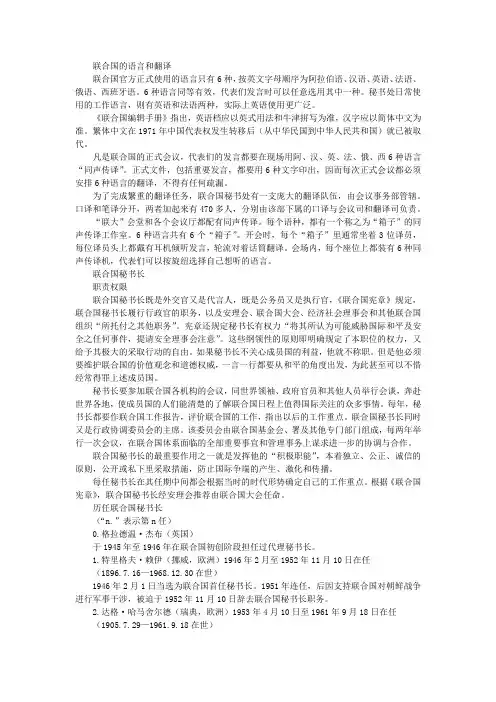
联合国的语言和翻译联合国官方正式使用的语言只有6种,按英文字母顺序为阿拉伯语、汉语、英语、法语、俄语、西班牙语。
6种语言同等有效,代表们发言时可以任意选用其中一种。
秘书处日常使用的工作语言,则有英语和法语两种,实际上英语使用更广泛。
《联合国编辑手册》指出,英语档应以英式用法和牛津拼写为准,汉字应以简体中文为准。
繁体中文在1971年中国代表权发生转移后(从中华民国到中华人民共和国)就已被取代。
凡是联合国的正式会议,代表们的发言都要在现场用阿、汉、英、法、俄、西6种语言“同声传译”。
正式文件,包括重要发言,都要用6种文字印出,因而每次正式会议都必须安排6种语言的翻译,不得有任何疏漏。
为了完成繁重的翻译任务,联合国秘书处有一支庞大的翻译队伍,由会议事务部管辖。
口译和笔译分开,两者加起来有470多人,分别由该部下属的口译与会议司和翻译司负责。
“联大”会堂和各个会议厅都配有同声传译。
每个语种,都有一个称之为“箱子”的同声传译工作室。
6种语言共有6个“箱子”。
开会时,每个“箱子”里通常坐着3位译员,每位译员头上都戴有耳机倾听发言,轮流对着话筒翻译。
会场内,每个座位上都装有6种同声传译机,代表们可以按旋纽选择自己想听的语言。
联合国秘书长职责权限联合国秘书长既是外交官又是代言人,既是公务员又是执行官,《联合国宪章》规定,联合国秘书长履行行政官的职务,以及安理会、联合国大会、经济社会理事会和其他联合国组织“所托付之其他职务”。
宪章还规定秘书长有权力“将其所认为可能威胁国际和平及安全之任何事件,提请安全理事会注意”。
这些纲领性的原则即明确规定了本职位的权力,又给予其极大的采取行动的自由。
如果秘书长不关心成员国的利益,他就不称职。
但是他必须要维护联合国的价值观念和道德权威,一言一行都要从和平的角度出发,为此甚至可以不惜经常得罪上述成员国。
秘书长要参加联合国各机构的会议,同世界领袖、政府官员和其他人员举行会谈,奔赴世界各地,使成员国的人们能清楚的了解联合国日程上值得国际关注的众多事情。
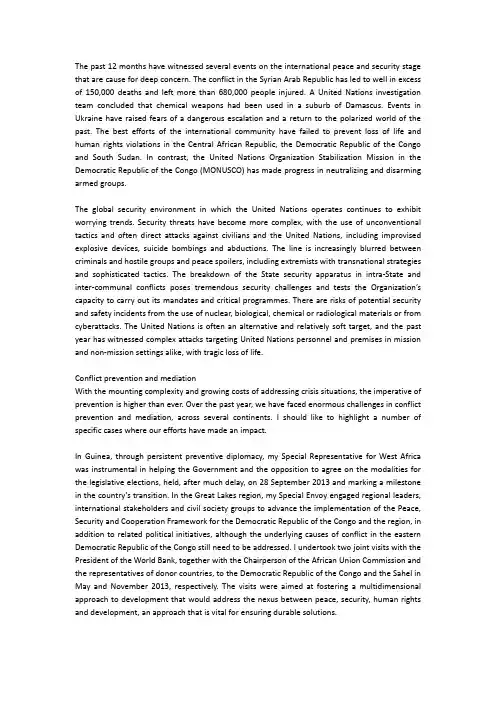
The past 12 months have witnessed several events on the international peace and security stage that are cause for deep concern. The conflict in the Syrian Arab Republic has led to well in excess of 150,000 deaths and left more than 680,000 people injured. A United Nations investigation team concluded that chemical weapons had been used in a suburb of Damascus. Events in Ukraine have raised fears of a dangerous escalation and a return to the polarized world of the past. The best efforts of the international community have failed to prevent loss of life and human rights violations in the Central African Republic, the Democratic Republic of the Congo and South Sudan. In contrast, the United Nations Organization Stabilization Mission in the Democratic Republic of the Congo (MONUSCO) has made progress in neutralizing and disarming armed groups.The global security environment in which the United Nations operates continues to exhibit worrying trends. Security threats have become more complex, with the use of unconventional tactics and often direct attacks against civilians and the United Nations, including improvised explosive devices, suicide bombings and abductions. The line is increasingly blurred between criminals and hostile groups and peace spoilers, including extremists with transnational strategies and sophisticated tactics. The breakdown of the State security apparatus in intra-State and inter-communal conflicts poses tremendous security challenges and tests the Organization’s capacity to carry out its mandates and critical programmes. There are risks of potential security and safety incidents from the use of nuclear, biological, chemical or radiological materials or from cyberattacks. The United Nations is often an alternative and relatively soft target, and the past year has witnessed complex attacks targeting United Nations personnel and premises in mission and non-mission settings alike, with tragic loss of life.Conflict prevention and mediationWith the mounting complexity and growing costs of addressing crisis situations, the imperative of prevention is higher than ever. Over the past year, we have faced enormous challenges in conflict prevention and mediation, across several continents. I should like to highlight a number of specific cases where our efforts have made an impact.In Guinea, through persistent preventive diplomacy, my Special Representative for West Africa was instrumental in helping the Government and the opposition to agree on the modalities for the legislative elections, held, after much delay, on 28 September 2013 and marking a milestone in the country’s transition. In the Great Lakes region, my Special Envoy engaged regional leaders, international stakeholders and civil society groups to advance the implementation of the Peace, Security and Cooperation Framework for the Democratic Republic of the Congo and the region, in addition to related political initiatives, although the underlying causes of conflict in the eastern Democratic Republic of the Congo still need to be addressed. I undertook two joint visits with the President of the World Bank, together with the Chairperson of the African Union Commission and the representatives of donor countries, to the Democratic Republic of the Congo and the Sahel in May and November 2013, respectively. The visits were aimed at fostering a multidimensional approach to development that would address the nexus between peace, security, human rights and development, an approach that is vital for ensuring durable solutions.In Somalia, the establishment of a new political mission in Mogadishu for the first time since 1995 was an important milestone. Complex challenges remain. My Special Representative continues to support the Government and other actors in the country through his good offices. His role in support of a peaceful indirect election in Puntland in January 2014 has been widely acknowledged.My Special Adviser on Yemen, working closely with the Gulf Cooperation Council and the Security Council, facilitated the successful conclusion of the National Dialogue Conference in January 2014. To mobilize support for the stability of Lebanon against the impact of the Syrian conflict, I established an international support group in September 2013. We also continued to support the efforts of the Lebanese authorities to preserve security and unity, including through the formation of a government of national interest. The recent deterioration notwithstanding, United Nations support to the Israeli-Palestinian peace process remains a priority, with the goal of establishing a peaceful settlement and a two-State solution.In Myanmar, the progress made in strengthening democratic and human rights institutions, inclusive socioeconomic development and peace efforts between the Government and various armed ethnic groups is at risk of being undermined by growing communal tensions and religious strife. Our good offices effort will need to be sustained in order to continue to tackle those issues, in addition to constitutional reform, national reconciliation and other challenges emerging at this critical juncture.In our conflict prevention and mediation work, we continue to face challenges regarding how best to engage with sometimes amorphous movements or fractured armed groups and how to ensure inclusivity. There is increasing interest in national dialogues as a tool, Yemen being an example. Consultation with women’s groups is also one of my priorities and has been conducted in six of our processes over the past year (Georgia, Mali, Sudan (Darfur), Syrian Arab Republic, Yemen and Western Sahara). High-level gender expertise has been systematically provided to most peace and security processes.We have been able to better respond to increasing demands from Member States to support national actors in their conflict prevention and mediation efforts. In South America, where peace talks between the Government of Colombia and the Fuerzas Armadas Revolucionarias de Colombia were launched in August 2012, the United Nations has supported the contribution of civil society through dialogue mechanisms.Experience over the past year has also highlighted the important role of regional and subregional organizations, with which we have strengthened our relationships. Our regional offices in West Africa, Central Africa and Central Asia have played a significant role in fostering conflict prevention and mediation partnerships, in addition to rapid responses to regional crises.There are also, however, several tragic cases where we have not been successful. While our joint efforts with the League of Arab States to put an end to the violence in the Syrian Arab Republic succeeded in bringing the sides together in two rounds of talks in Geneva, unfortunately the talkshave yielded little. More than 150,000 people, including over 10,000 children, have been killed in the Syrian Arab Republic since March 2011. A further 6.5 million are internally displaced and 2.8 million are seeking refuge in other countries, notably Egypt, Iraq, Jordan, Lebanon and Turkey. In the unfolding tragedy of the Central African Republic, the United Nations has been assisting the Economic Community of Central African States, its mediator and the African Union in endeavouring to resolve the crisis. Thousands of people have been killed since March 2013 when the Séléka rebel coalition ousted the President, François Bozizé. At the time of preparation of the present report, more than 625,000 people had been displaced throughout the country. While our immediate priority is to stop the violence, we are working to facilitate a political process, with particular attention to the need for reconc iliation. During the period under review, conflict-related sexual violence remained underreported but prevalent in settings such as the Central African Republic, Côte d’Ivoire, the Democratic Republic of the Congo, Libya, Somalia, South Sudan and the Syrian Arab Republic. The continued political will to prevent this scourge was exemplified by the Declaration of Commitment to End Sexual Violence in Conflict, launched on the sidelines of the sixty-eighth session of the General Assembly, and the subsequent Global Summit to End Sexual Violence in Conflict, held in London in June 2014. To translate political will into specific action, my Special Representative on Sexual Violence in Conflict has continued to engage with national authorities at the highest level.The adoption of Security Council resolution 2122 (2013), general recommendation No. 30 of the Committee on the Elimination of Discrimination against Women and the declaration of the Peacebuil ding Commission on women’s economic empowerment for peacebuilding represent significant steps in advancing the women and peace and security agenda more broadly.The Security Council has called for sustained monitoring and reporting on the violations affecting children in armed conflict and for perpetrators to be brought to account. In March 2014, my Special Representative for Children and Armed Conflict and the United Nations Children’s Fund launched the global campaign “Children, Not Soldiers”, which is a imed at ending and preventing the recruitment and use of children by all national security forces in conflict by 2016.Democratic transitions and electionsCountries undergoing or seeking to consolidate democratic transition continue to benefit from inclusive, participatory, transparent and nationally owned constitutional reform. The implementation of a new constitution can take years and sometimes decades of commitment for the goals of democracy, good governance and the rule of law to be realized and enjoyed. The past 12 months have seen an increase in constitutional reform processes and requests from Member States for the United Nations to provide constitutional support, with peace operations and/or country teams providing assistance to more than a dozen Member States during the period under review. The United Nations country team continued to support reform efforts in Tunisia, where, setbacks notwithstanding, commitments to inclusive dialogue and consensus-building resulted in a more legitimate and nationally owned constitution and the foundation for stability and democratic governance, which is expected to culminate in elections in 2015.Member States have continued to see the value of United Nations support to electoral processes, with requests for assistance —which include technical assistance, the engagement of good offices and support to regional organizations —remaining high. For example, while technical assistance was provided to Afghanistan in the context of the presidential election held in 2014, my Special Representative also supported broad consultations on the legal framework and on the appointment of electoral commissioners. In Nepal, the Organization continued to provide technical support to the electoral commission and supported efforts to ensure that the political commitments of all relevant actors regarding the Constituent Assembly election held in November 2013 were met. A similar approach was taken in Guinea-Bissau. In Madagascar, the United Nations provided assistance to the electoral commission and worked with the Southern African Development Community and the African Union to enable peaceful elections in 2013 and the end of the transition process in 2014.Electoral assistance has been provided in challenging security environments, many under Security Council mandates. In Mali, the Organization supported the conduct of the 2013 presidential and legislative elections that ended the transition process. The United Nations Assistance Mission in Iraq supported the electoral commission with the legislative elections in 2014, in spite of the difficult operating environment. The United Nations Support Mission in Libya supported the elections for the Constitutional Drafting Assembly and Council of Representatives, held in February and June 2014, respectively, as part of the post-conflict transition process. Further to a Security Council mandate and a request from the Transitional Government, the United Nations is providing support in the Central African Republic for the preparation and conduct of a referendum on the Constitution, in addition to presidential and legislative elections.Civil society organizations around the world have continued to demand to participate in transitions, governance and elections. That was reflected in the work of the United Nations Democracy Fund, which received more than 2,000 project proposals from organizations in over 130 countries during its annual proposal window. They included wide-ranging proposals from countries in transition, including Libya and Tunisia, where civil society had previously been almost non-existent or under severe government control. At the same time, a growing number of Governments have proposed national legislation restricting the freedom of civil society groups to operate, including with regard to international funding.PeacekeepingMember States have demonstrated their continued interest in using peacekeeping and continued to recognize it as an effective and cost-effective tool, without which the human and material costs of conflict and relapse into conflict would be unquestionably higher. Although the environments for United Nations peacekeeping operations have always been challenging, we face today a heightened level and new types of security threat, requiring new approaches and strategies. Peacekeeping operations are being increasingly deployed earlier in the conflict continuum, before any peace or ceasefire agreement. Creating the political and security space necessary for successful negotiations is crucial. The lessons of early deployment contexts need to be better analysed and recognized.Achievements in the period under review included the establishment and deployment of the United Nations Multidimensional Integrated Stabilization Mission in Mali, promoting reconciliation and political dialogue, including with armed groups, and the stabilization of the security situation, in particular in the north of the country, which remains volatile. In the Democratic Republic of the Congo, MONUSCO addressed the crisis in the east, including by supporting the Peace and Security Framework and the deployment of the Force Intervention Brigade. In addition, the United Nations Stabilization Mission in Haiti facilitated constructive political dialogue, including on long-awaited legislative and local elections. We also supported the planning and deployment of the African-led International Support Mission in the Central African Republic and its transformation into a United Nations peacekeeping operation as the United Nations Multidimensional Integrated Stabilization Mission in the Central African Republic.South Sudan has been gripped by violence and ethnic strife since mid-December 2013. While the United Nations Mission in South Sudan is protecting tens of thousands of civilians in its bases throughout the country, a political agreement between the parties is needed to halt the descent into a worsening spiral of violence and is vital to alleviating the plight of civilians. In the Golan, the United Nations Disengagement Observer Force has continued to operate under extremely challenging conditions amid the continuing armed conflict in the Syrian Arab Republic. Together with the United Nations Interim Force in Lebanon and the United Nations Truce Supervision Organization, it has contributed to containing the crisis. The United Nations Mission in Liberia has contributed to improving security throughout the country, but there are concerns about the future as it draws down. There are similar concerns in Côte d’Ivoire in view of the elections scheduled for October 2015 and the gradual drawdown of the United Nations mission. The African Union-United Nations Hybrid Operation in Darfur has made important strides towards promoting peace and stability, but shortfalls in troop- and police-contingent capabilities and the need for improved coordination and integration structures within the mission remain challenges to the effective implementation of the mandate.Financial and capability constraints have a significant impact on our ability to deliver. The cost of peacekeeping, per capita, has been reduced by 15 per cent compared with four years ago. The United Nations continues to seek greater efficiency while increasing the effectiveness of its field missions. Human and material resources are limited, yet host populations and the international community expect us to protect civilians and implement varied and complex peacekeeping and early peacebuilding mandates. Fully meeting those expectations is a challenge.The field support requirements for our field missions continue to grow, with demand for more flexible, mobile and nimble operations able to deploy swiftly into increasingly inhospitable settings. In South Sudan, enhanced mobility and standby arrangements would have greatly assisted in the rapid strengthening of the mission when the crisis erupted. In Darfur, the African Union-United Nations Hybrid Operation continues to operate across vast spaces and difficult terrain to protect civilians and facilitate humanitarian assistance, in spite of the increased number of attacks against peacekeepers. Ensuring that United Nations troops are properly supported and equipped is a high priority. We are striving to achieve the greatest possible impact on the ground with the resources that we are given, advancing our field support efforts throughthe global field support strategy.Supporting missions in the field will require an exploration of technological and other advances to improve effectiveness, increase efficiency and minimize the environmental footprint of field operations. Incorporating solutions offered by new technologies and other innovations remains a priority. The complexity of contemporary peacekeeping environments requires strengthened partnerships with all stakeholders, including regional and subregional organizations, the wider United Nations family, international and regional financial institutions and donors, and multilateral and bilateral partners. Only through such collaboration can we collectively address the challenges that we face.To be truly effective, United Nations peacekeeping requires the highest political engagement and support from the international community and host Governments. In the Democratic Republic of the Congo, a coordinated political strategy in the form of the Peace and Security Framework has been vital in underpinning the efforts of MONUSCO to neutralize and disarm armed groups. The consent of the host Government, the support of host communities, the active involvement of all key parties, the inclusion of women in peace processes, the strong political engagement of key Member States and the provision of the resources and authority required for the Secretariat to deliver the mandates provided have all been critical, as have the political will and support of the Security Council and police- and troop-contributing countries.PeacebuildingThe past year saw an important milestone in the emergence of Sierra Leone from conflict, with the closure of the United Nations Integrated Peacebuilding Office in that country in March 2014 and the transfer of res ponsibility for the Organization’s continued support to the United Nations country team. Peacebuilding remains an unpredictable enterprise, however, with the constant risk of relapse, as demonstrated by the re-eruption of violent conflict in the Central African Republic and South Sudan, in addition to political tensions in Guinea and a challenging road towards the restoration of constitutional order in Guinea-Bissau.The Peacebuilding Commission brought to bear the collective weight of Member States in support of peacebuilding processes in six countries. In Sierra Leone, the Commission accompanied the country through the transition. With the assistance of the Peacebuilding Support Office, Member States also continued to provide political support to United Nations officials and mandates in Burundi and Liberia. My Special Representatives also benefited from the support, in difficult circumstances, of the Peacebuilding Commission in the Central African Republic, Guinea and Guinea-Bissau, which helped to reinforce their political messages and efforts to mobilize international and regional supportThe Peacebuilding Fund also played a critical role, allocating $86.7 million, a significant increase over the amount in 2012, to support peaceful transitions in 14 post-conflict countries in 2013. The Fund supported United Nations responses to the relapse into violence in the Central African Republic and Guinea -Bissau. In Guinea and Yemen, it supported critical mediation efforts and national dialogues. Elsewhere, in Burundi, Kyrgyzstan, Liberia and Sierra Leone, the Fundprovided assistance in the areas of decentralization, justice, human rights and the participation of women in politics.。
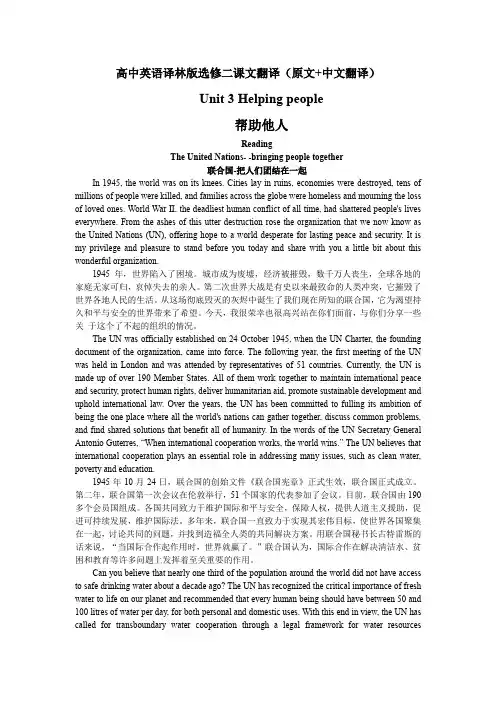
高中英语译林版选修二课文翻译(原文+中文翻译)Unit 3 Helping people帮助他人ReadingThe United Nations--bringing people together联合国-把人们团结在一起In 1945, the world was on its knees. Cities lay in ruins, economies were destroyed, tens of millions of people were killed, and families across the globe were homeless and mourning the loss of loved ones. World War II, the deadliest human conflict of all time, had shattered people's lives everywhere. From the ashes of this utter destruction rose the organization that we now know as the United Nations (UN), offering hope to a world desperate for lasting peace and security. It is my privilege and pleasure to stand before you today and share with you a little bit about this wonderful organization.1945年,世界陷入了困境。
城市成为废墟,经济被摧毁,数千万人丧生,全球各地的家庭无家可归,哀悼失去的亲人。
第二次世界大战是有史以来最致命的人类冲突,它摧毁了世界各地人民的生活。
从这场彻底毁灭的灰烬中诞生了我们现在所知的联合国,它为渴望持久和平与安全的世界带来了希望。
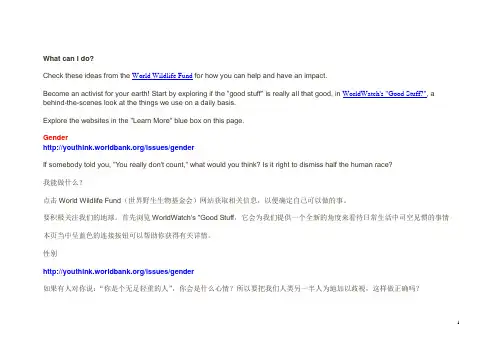
What can I do?Check these ideas from the World Wildlife Fund for how you can help and have an impact.Become an activist for your earth! Start by exploring if the "good stuff" is really all that good, in WorldWatch's "Good Stuff?", a behind-the-scenes look at the things we use on a daily basis.Explore the websites in the "Learn More" blue box on this page.Gender/issues/genderIf somebody told you, "You really don't count," what would you think? Is it right to dismiss half the human race?我能做什么?点击World Wildlife Fund(世界野生生物基金会)网站获取相关信息,以便确定自己可以做的事。
要积极关注我们的地球。
首先浏览WorldWatch's "Good Stuff,它会为我们提供一个全新的角度来看待日常生活中司空见惯的事情本页当中呈蓝色的连接按钮可以帮助你获得有关详情。
性别/issues/gender如果有人对你说:“你是个无足轻重的人”,你会是什么心情?所以要把我们人类另一半人为地加以歧视,这样做正确吗?What is it?Sexual identity, especially in relation to society or culture; the condition of being female or male.Gender refers to socially constructed roles and learned behaviors and expectations associated with females and males. When talking about gender, people usually talk about gender inequality—women and girls having fewer opportunities in life simply because they are female. The term gender, however, also refers to boys and men, who are equally defined by the rights and roles "assigned" to them. Giving equal rights and consideration to girls and women should not take the same away from males.While women worldwide have made great strides to prove they are as smart and capable as men, in many countries they are still not treated as equals. Girls and women aren't given the same rights, opportunities, responsibilities and choices in life that boys and men consider their birthright.它是什么?性别身份,尤其是在社会或文化方面;成为男性或女性。
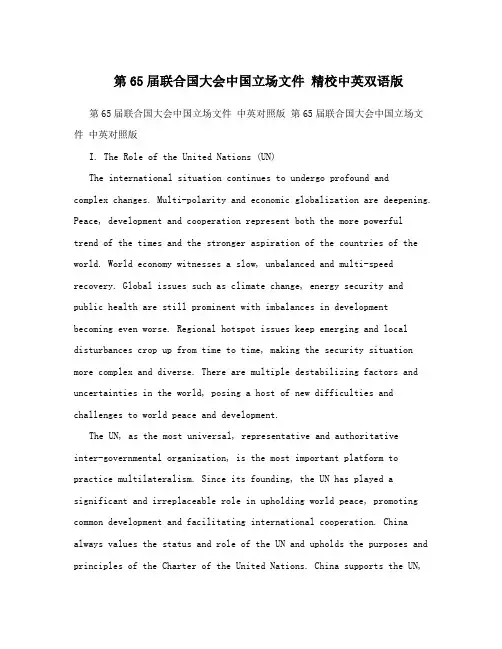
第65届联合国大会中国立场文件精校中英双语版第65届联合国大会中国立场文件中英对照版第65届联合国大会中国立场文件中英对照版I. The Role of the United Nations (UN)The international situation continues to undergo profound andcomplex changes. Multi-polarity and economic globalization are deepening. Peace, development and cooperation represent both the more powerfultrend of the times and the stronger aspiration of the countries of the world. World economy witnesses a slow, unbalanced and multi-speed recovery. Global issues such as climate change, energy security and public health are still prominent with imbalances in development becoming even worse. Regional hotspot issues keep emerging and local disturbances crop up from time to time, making the security situation more complex and diverse. There are multiple destabilizing factors and uncertainties in the world, posing a host of new difficulties and challenges to world peace and development.The UN, as the most universal, representative and authoritativeinter-governmental organization, is the most important platform to practice multilateralism. Since its founding, the UN has played a significant and irreplaceable role in upholding world peace, promoting common development and facilitating international cooperation. China always values the status and role of the UN and upholds the purposes and principles of the Charter of the United Nations. China supports the UN,under the current circumstances, in further harnessing its advantages and taking effective actions to coordinate international efforts in response to global threats and challenges and continuing to play a central role in international affairs.一、联合国作用当前,国际形势继续发生深刻、复杂的变化。
联合国文件翻译探析作者:汪洋来源:《科学大众·教师版》2014年第06期摘要:联合国文件翻译要求准确严谨、连贯一致,因此,译者在翻译过程中应忠实于原文精神,把握细微差,使用固定术语和惯用表达,体现原文风格。
本文分析了联合国文件翻译中应注意的四个要点。
关键词:联合国文件;翻译中图分类号:H315.9 文献标识码:A 文章编号:1006-3315(2014)06-136-001一、引言联合国文件涉及政治、经济、社会、法律、科技等各个方面,可谓包罗万象,无所不及;文件格式也多种多样,从决议、公约、宣言至函件、声明、报告等等。
(蔡力坚,2011:89)因此,要译好联合国文件,译者除了应具有良好的双语转换能力外,还应把握联合国文件的一些特点。
二、联合国文件翻译的特点1.译文须完整完整指译文完整无遗漏,不随意增删字词。
从篇章来看,每个标题、脚注、附件都必须翻译出来;从句子来看,一句话当中凡是有实义的修饰语、限定语、从句都必须翻译出来,不能省略。
有时为了照顾语言习惯的不同,可酌情增添一些关联词、副词、语气词,但前提是不能对原文做出实质性的扩展,或增添原文里并未包含的意思。
例1 Tourism could serve as a rich source of development benefits, including increased income, foreign currency earnings, economic diversification and employment.译文一:旅游业可以产生许多发展惠益,包括增加的收入、外汇的获取、经济的多样化和就业机会。
译文二:旅游业可以产生许多发展惠益,包括提高收入、赚取外汇、促使经济多样化和创造就业机会。
为了让译文更完整,译文二中就适当增加了一些原文中并未包含的词语。
2.译文须准确准确指不仅要忠实于原文的基本意思,还要忠实于其感情色彩、细微差别等。
浅谈联合国文件的翻译策略作者:许丹来源:《科教导刊》2013年第11期摘要在众多种类的文件翻译中,联合国文件翻译由于联合国这一国际组织的职能特点和性质体现出不同于其他普通机构文件翻译的特点。
本文从联合国文件的语言特点为切入点,主要从词汇和句式两个层面探讨联合国文件翻译的翻译策略。
笔者认为,在词汇翻译方面,译者除了需要注重动词名词化的翻译策略外,还须牢记大量词汇或术语的固定译法。
在句式方面,主要可以采用嵌入法、分离法和重塑法进行翻译。
关键词联合国文件翻译词汇句式中图分类号:H315.9 文献标识码:A0 引言作为目前世界上最大的国际组织,联合国在指导国际关系的各项原则方面发挥着重要的作用。
在联合国,“文件”是指提交联合国主要机关或附属机构供其审议的文本,而不论其是否采用任何复制形式(1983, United Nations Editorial Manual)。
联合国文件的语言特点都可以用以下几个字概括:即简明、流畅和准确(赵兴民,109)。
然而,众所周知,联合国文件具有较强的政治敏感性,同时,在语言、文化和思维方式等方面也具有其独特的多样性(United Nations, 2000)。
因此,联合国这一国际组织的性质及职能特点决定着联合国文件有别于其他普通机构文件的特点。
联合国文件的内容会涉及各类专业领域,因此会含有大量的专业术语,而且,句子结构复杂,对于译者来说,要想熟练而准确地翻译联合国文件并非易事。
因此,本文针对联合国文件的几个主要特点,从词汇和句式层面分析翻译联合国文件所应采取的策略,以期能够提高联合国文件翻译的质量。
1 联合国文件的语言特点及翻译策略1.1 基于词汇层面的语言特点及其翻译策略联合国文件擅于采用许多专业术语,其特点就是词汇的语域较高。
其中最主要的特点就是名词化特点明显,主要表现在:在很多句子当中有很多动名词、分词或者名词结构,虽然行文庄重典稳健,大气典雅,但却对译者造成不小的困难。
联合国文件英汉翻译中文译版中四字成语的使用探究作者:钱璐来源:《青年文学家》2015年第05期摘 ;要:自1945年建立以来,联合国在处理国际事务及协调各国关系方面扮演着重要角色。
在对其英语文件的英汉翻译中,一味的使用四字成语会使译文产生歧义。
本文就此进行举例分析,并就四字成语在译文中的使用进行探究。
关键词:联合国;文件翻译;中文译本;四字成语[中图分类号]:H059[文献标识码]:A[文章编号]:1002-2139(2015)-05--01作为拥有193个成员国的大家庭,联合国的首要任务便是协调各成员国之间的沟通问题,而沟通最重要靠翻译来解决。
在翻译的实践过程中,比起文学翻译,文件翻译似乎关注度不高。
联合国文件翻译,顾名思义,就是对联合国各类书面文献的翻译。
联合国的文件翻译质量较高,但并不意味着联合国的文件翻译版本就是最完美的。
对于像联合国这样的国际性组织,在文件翻译中,准确性是第一要务。
由于有些联合国文件是长期艰苦谈判的产物,措辞严谨,译文必须体现出词义的细微差别。
有些是各方妥协的产物,故意将词义模糊化处理,译文也必须体现这种模糊。
况且笔译人员不能亲临会场,不了解各方争论的焦点,因此需要特别忠实于原文,在英汉互译过程中,中文译本中的选词要格外考究。
在数据收集过程中发现,大量的四字成语在联合国文件的中文翻译版本中出现,例如“东躲西藏”“与世隔绝”“天壤之别”“真名实姓” “蜂拥而至”“付之东流”等。
汉语四格成语是人们在长期生活中积累下来的固定词组,其结构工整、格式固定、意思明确。
使用四字成语可以使表达更加简洁明了,表达清晰,语言优美,结构对称。
但在联合国文件翻译的译本中大量使用四字成语有时会对原文本造成误译。
以下便是从联合国文件中选取的几个例子用来做具体分析。
例一[Original text] Societies differ greatly in their capacity to manage population movements and assimilate migrants, and a capacity adequate to manage moderate and/or gradual flows may be overwhelmed by massive and/or sudden flows.[UN translation] 不同社会在管理人口移动和使移徙者融入其中的能力方面有天壤之别,而足以管理适度和(或)逐渐流动的能力可能无法应付大量和(或)突然的流动。
《联合国人权宣言》中英文对照《世界人权宣言》是人权史上具有里程碑意义的文件。
它由来自世界各个地区不同法律和文化背景的代表起草,于1948年12月10日在巴黎召开的大会会议上以第217A(III)号决议通过。
《世界人权宣言》作为所有国家和所有人民的共同成就,第一次规定了基本人权应得到普遍保护。
《世界人权宣言》已被翻译成近500种语言。
《宣言》是1948年12月10日第三届联合国大会通过的,是有组织的国际社会第一次就人权和基本自由作出的世界性宣言。
《宣言》由联合国人权委员会起草,并由联合国经济和社会理事会正式提交联合国大会,在一系列修正案的基础上,大会经过认真讨论、审议后予以通过。
《宣言》是国际人权宪章体系的第一个文件。
它明确提出了联合国系统人权活动的基本原则。
《宣言》在序言中称:鉴于“对人类家庭所有成员的固有尊严及其平等的和不移的权利的承认,乃是世界自由、正义与和平的基础”,及“各会员国业已誓愿同联合国合作以促进对人权和基本自由的普遍尊重和遵行”,因此制定这一宣言。
序言中还说,宣言作为所有人民和国家努力实现的共同标准,期望每一个人和社会机构努力促进权利和自由的实现,并通过国家和国际社会的措施,使这些权利和自由得到普遍和有效的承认与尊重。
《宣言》共30条。
它第一次在国际范围内系统地提出了人权的基本内容和奋斗目标。
《宣言》提出,人人生而自由,在尊严和权利上一律平等;人人都有资格享受本《宣言》所载的一切权利和自由,不论其种族、肤色、性别、语言、财产、宗教、政治或其他见解、国籍或其他出身、身份。
这些权利和自由可分为公民权利和政治权利以及经济、社会和文化权利两大类。
其中,公民权利和政治权利包括:生命权、人身权、不受奴役和酷刑权、人格权、法律面前人人平等权、无罪推定权、财产权、婚姻家庭权、思想良心和宗教自由权、参政权和选举权等等;经济、社会和文化权利包括:工作权、同工同酬权、休息和定期带薪休假权、组织和参加工会权、受教育权、社会保障和享受适当生活水准权、参加文化生活权等等。